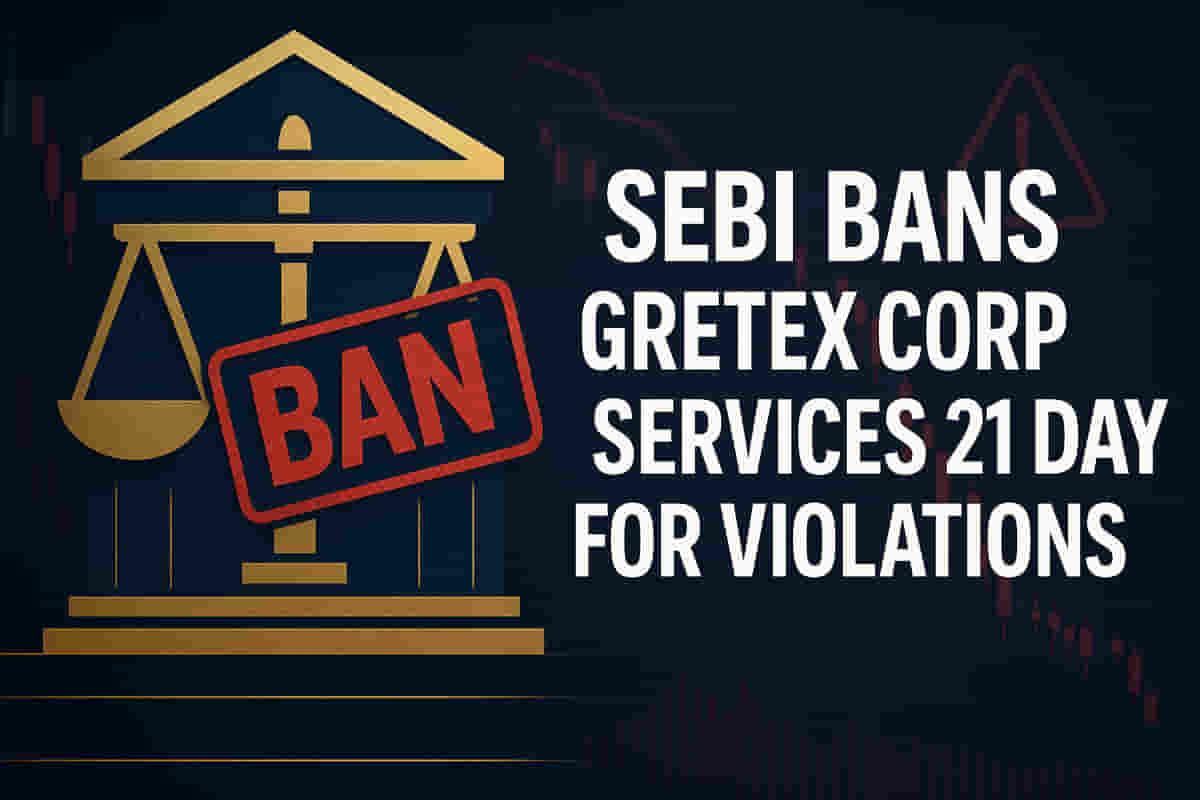SEBI Bans Gretex Corporate Services for 21 Days Over Net Worth Lapses and Due Diligence Failures
SEBI/Exchange
|
Updated on 30 Oct 2025, 05:46 pm
Reviewed By
Aditi Singh | Whalesbook News Team
Short Description :

▶
Stocks Mentioned :
Detailed Coverage :
The Securities and Exchange Board of India (SEBI) has imposed a 21-day ban on Gretex Corporate Services from taking up any new merchant banking assignments. This action stems from two primary issues identified during SEBI's inspection:
1. **Failure to Maintain Minimum Net Worth**: Gretex Corporate Services did not maintain the prescribed minimum regulatory net worth of ₹5 crore during the financial year 2019-20, which is a violation of merchant banker rules. 2. **Inadequate Due Diligence in Public Issue**: SEBI found that Gretex failed to conduct proper due diligence while managing the SME public issue of a company. Specifically, nearly 40% of the Initial Public Offering (IPO) proceeds were earmarked for leasing office space that was still under construction. This critical detail was not adequately verified or disclosed to investors by Gretex.
SEBI emphasized that this omission was a substantive failure going to the root of the due diligence obligation. The order came into effect immediately.
In separate actions, SEBI also imposed a penalty of ₹5 lakh each on Ritu Agarwal, Shyam Sunder Vyas HUF, and Middleton Goods Pvt Ltd. These penalties were for engaging in non-genuine trades and creating artificial volume in the illiquid stock options segment on the Bombay Stock Exchange (BSE) between April 2014 and September 2015.
**Impact**: These actions by SEBI highlight increased regulatory scrutiny on financial intermediaries and market participants. The ban on Gretex could impact its business operations and reputation, while penalties on other entities serve as a deterrent against market manipulation. Such measures aim to uphold market integrity and protect investor interests, potentially leading to a more cautious approach among market participants and increased investor confidence in the regulatory framework. The strict enforcement could lead to greater transparency and adherence to rules within the financial sector.
**Difficult terms with meaning**: * **Merchant Banking**: Services provided by financial institutions that help companies raise capital through the issuance of stocks and bonds. * **Regulatory Net Worth**: The minimum amount of capital a financial services firm must hold to ensure its stability and ability to meet its obligations, as mandated by regulators. * **Due Diligence**: A thorough investigation or audit of a potential investment or product to confirm all facts and details, ensuring there are no hidden risks or misrepresentations. * **Public Issue**: An offer by a company to sell its shares or bonds to the general public for the first time (IPO) or subsequent times. * **IPO Proceeds**: The total amount of money a company raises from selling its shares in an Initial Public Offering. * **Illiquid Stock Options Segment**: A part of the stock market where options contracts (agreements to buy or sell a stock at a specific price by a certain date) are traded infrequently, making them hard to buy or sell quickly without significantly impacting their price. * **Non-genuine Trades**: Transactions that are not legitimate market activities and are often conducted to manipulate trading volumes, prices, or create a false impression of market activity.
More from SEBI/Exchange
Latest News

Auto
Suzuki and Honda aren’t sure India is ready for small EVs. Here’s why.

Brokerage Reports
Stocks to buy: Raja Venkatraman's top picks for 4 November

Mutual Funds
Quantum Mutual Fund stages a comeback with a new CEO and revamped strategies; eyes sustainable growth

Tech
Why Pine Labs’ head believes Ebitda is a better measure of the company’s value

Banking/Finance
SEBI is forcing a nifty bank shake-up: Are PNB and BoB the new ‘must-owns’?

Industrial Goods/Services
India’s Warren Buffett just made 2 rare moves: What he’s buying (and selling)
Renewables Sector

Renewables
Brookfield lines up $12 bn for green energy in Andhra as it eyes $100 bn India expansion by 2030
Startups/VC Sector

Startups/VC
a16z pauses its famed TxO Fund for underserved founders, lays off staff
Renewables Sector

Brookfield lines up $12 bn for green energy in Andhra as it eyes $100 bn India expansion by 2030
Startups/VC Sector
